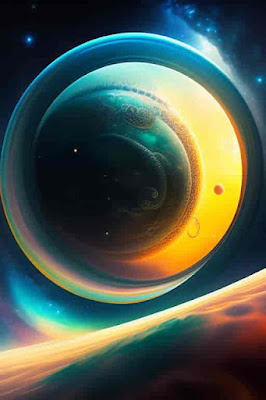Unraveling the Mystries of the Multiverse ~
Unravelling the Mysteries of the Multiverse: A Journey into Parallel Realities ~
Introduction:
The concept of a multiverse has captured the imagination of scientists, philosophers, and science fiction enthusiasts for decades. The idea that our universe might be just one of many parallel realities existing simultaneously has led to profound discussions about the nature of existence, the possibilities of alternate timelines, and the implications of such a complex and mind-boggling concept. In this blog, we will dive into the fascinating realm of the multiverse, exploring its origins, theoretical foundations, and the ongoing debates surrounding its existence.
Origins of the Multiverse Hypothesis:
The notion of a multiverse is rooted in the quest to explain some of the perplexing questions posed by the nature of our universe. In the early 20th century, physicists such as Hugh Everett III and Bryce DeWitt developed the concept of the "many-worlds" interpretation of quantum mechanics. This theory suggests that every time a quantum event occurs, the universe splits into multiple branches, giving rise to a multitude of parallel realities. While this interpretation remains controversial, it laid the groundwork for broader discussions about the multiverse.
Types of Multiverse Theories:
There are several distinct multiverse theories that have been proposed by physicists and cosmologists. These theories stem from various branches of physics, including string theory, inflation theory, and quantum mechanics. Some of the prominent multiverse theories include:
1. Bubble Multiverse (Inflation Theory): Inflation theory suggests that the universe expanded exponentially in its early stages. In this scenario, different regions of space could have stopped inflating at different times, resulting in "bubble universes" with their own physical laws and constants.
2. String Theory Multiverse: String theory proposes that our universe is one of many "branes" floating in higher-dimensional space. These branes could be separated by vast distances and have distinct physical properties.
3. Parallel Universes (Many-Worlds Interpretation): As mentioned earlier, the many-worlds interpretation of quantum mechanics suggests that every possible outcome of a quantum event occurs, each in its own separate branch of reality.
4. Landscape Multiverse (String Theory): String theory also introduces the idea of a "landscape" of potential universes, each with different configurations of fundamental constants and particles.
Debates and Challenges:
While the concept of a multiverse is intriguing, it is not without its challenges and controversies. One of the main criticisms is the lack of empirical evidence to support these theories. Since other universes are, by definition, disconnected from ours, direct observation or verification is currently impossible. Additionally, some critics argue that invoking a multiverse could be seen as a "cop-out" to explain the fine-tuning of our universe's physical constants and laws.
Implications and Philosophical Considerations:
The multiverse hypothesis raises profound questions about the nature of reality, our place in the cosmos, and the concept of identity. If multiple universes exist, what does it mean for our understanding of individuality and consciousness? How would we define "reality" in such a complex landscape of possibilities? These questions not only challenge our scientific understanding but also touch on philosophical and existential realms.
Conclusion:
The concept of the multiverse is a captivating journey into the unknown, offering tantalising possibilities that stretch the limits of our imagination. While its existence remains a topic of debate, the multiverse hypothesis continues to push the boundaries of science and inspire discussions about the nature of reality itself. As we delve deeper into the mysteries of the cosmos, the multiverse stands as a reminder that the universe is a vast and enigmatic tapestry waiting to be unravelled.
-Keva







Wonderful work dear... I hope you will be regular now Luv you from Aarti...
ReplyDeleteTy Aarti, Yes, I'll try to be regular now...
DeleteAs a new reader, This Blog is the very first Blog which is written in a simple way!!! I am your new fan now dear Keva... Also you are my inspiration ☺️🙂 Thank you for the motivation 🙂 Luv you ❣️
ReplyDeleteThank you dear, I am glad you liked it... Keep Supporting 🙃
DeleteWonderful Information 🙂 Simple and easy to understand ☺️☺️ Luv you Madhya Pradesh
ReplyDeleteYes... Wonderful Information .....
ReplyDeleteThank you...
DeleteLove your blogs
ReplyDeleteThank you😇
DeleteBest
ReplyDeleteWonderful
ReplyDelete🙃
Delete